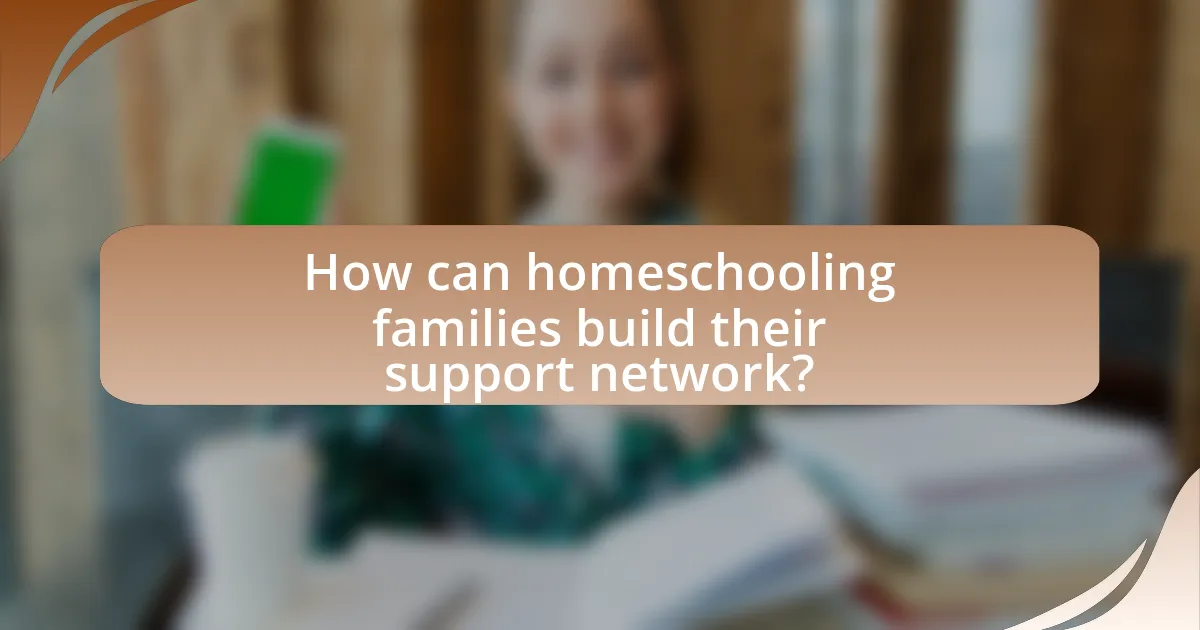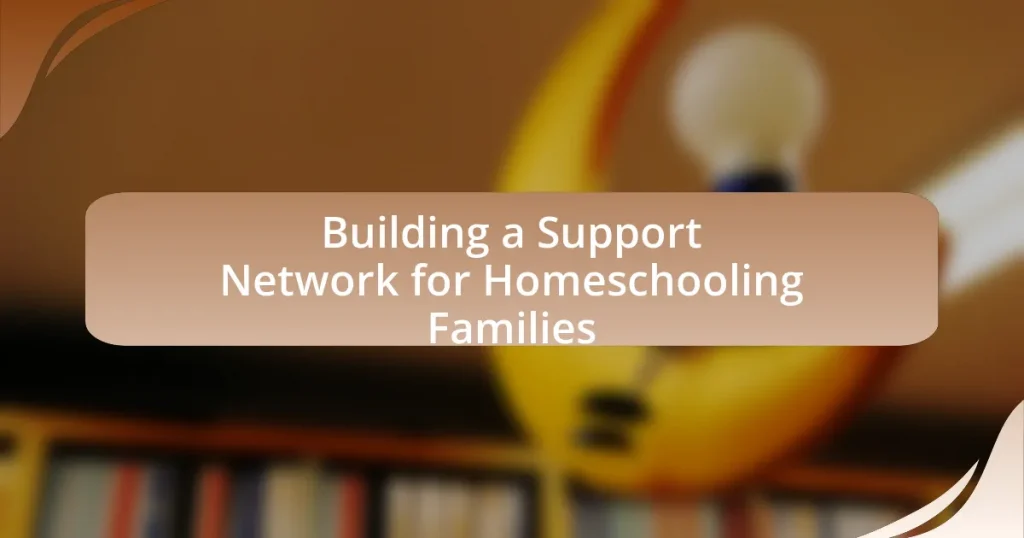A support network for homeschooling families is a collective of individuals and resources that provide emotional, educational, and practical assistance to those educating their children at home. This article outlines the importance of such networks in addressing challenges like social isolation and resource scarcity, while enhancing educational outcomes through shared knowledge and community engagement. Key components of effective support networks include trust, communication, and shared resources, with various roles played by parents, educators, and community members. Strategies for building and maintaining these networks, as well as the benefits they offer, are also discussed, emphasizing the positive impact on both parents and children involved in homeschooling.

What is a Support Network for Homeschooling Families?
A support network for homeschooling families is a group of individuals and resources that provide emotional, educational, and practical assistance to families who choose to educate their children at home. This network can include other homeschooling families, local co-ops, online forums, educational resources, and community organizations that offer workshops, social events, and shared learning opportunities. Research indicates that such networks enhance the homeschooling experience by providing socialization opportunities for children and support for parents, which can lead to improved educational outcomes and reduced feelings of isolation among homeschooling families.
Why is a support network important for homeschooling families?
A support network is important for homeschooling families because it provides essential resources, emotional support, and social interaction. Homeschooling can be isolating, and a network helps families connect with others who share similar educational philosophies and challenges. Research indicates that children who engage in social activities with peers tend to develop better social skills and emotional well-being. Additionally, support networks can offer practical assistance, such as sharing teaching materials and strategies, which enhances the educational experience.
What challenges do homeschooling families face that a support network can address?
Homeschooling families face challenges such as social isolation, lack of resources, and educational support that a support network can effectively address. Social isolation occurs when homeschooling families do not have regular interactions with peers, which can be mitigated through community groups and co-ops that provide socialization opportunities. Additionally, lack of resources, including access to educational materials and extracurricular activities, can be alleviated by sharing resources within a support network, allowing families to pool materials and knowledge. Educational support, including guidance on curriculum choices and teaching strategies, can be enhanced through mentorship and shared experiences within the network, fostering a collaborative learning environment.
How can a support network enhance the homeschooling experience?
A support network can enhance the homeschooling experience by providing emotional, educational, and social resources that foster a more effective learning environment. Such networks offer parents and students access to shared knowledge, teaching strategies, and curriculum resources, which can improve educational outcomes. For instance, research indicates that homeschooling families who engage with support groups report higher satisfaction and better academic performance due to collaborative learning opportunities and shared experiences. Additionally, social interactions within these networks help combat feelings of isolation, promoting mental well-being and community engagement among homeschooling families.
What are the key components of an effective support network?
The key components of an effective support network include trust, communication, shared resources, and emotional support. Trust establishes a safe environment where members feel comfortable sharing challenges and seeking help. Effective communication ensures that information flows freely, allowing members to stay informed and connected. Shared resources, such as educational materials and local activities, enhance the learning experience and provide practical assistance. Emotional support fosters resilience and motivation, helping members navigate the unique challenges of homeschooling. Research indicates that strong support networks significantly improve educational outcomes and overall well-being for homeschooling families.
What types of resources should be included in a support network?
A support network for homeschooling families should include educational resources, emotional support, practical assistance, and community connections. Educational resources encompass curriculum materials, online courses, and tutoring services that enhance learning. Emotional support can be provided through peer groups, counseling services, and mentorship programs that foster resilience and motivation. Practical assistance includes shared resources like co-op classes, childcare, and transportation arrangements that facilitate homeschooling logistics. Community connections involve local homeschooling groups, libraries, and extracurricular activities that promote socialization and engagement with other families. These components collectively create a robust support network that addresses the diverse needs of homeschooling families.
How can communication be facilitated within the network?
Communication within the network can be facilitated by implementing structured online platforms and regular meet-ups. Online platforms, such as dedicated forums or social media groups, allow homeschooling families to share resources, ask questions, and provide support in real-time. Regular meet-ups, whether virtual or in-person, foster personal connections and enhance collaboration among families, creating a stronger support system. Research indicates that structured communication channels significantly improve engagement and resource sharing among community members, as seen in studies on collaborative learning environments.
Who can be part of a homeschooling support network?
A homeschooling support network can include parents who homeschool their children, educators specializing in homeschooling, local community members, and organizations that promote homeschooling. These individuals and groups collaborate to share resources, provide emotional support, and exchange educational strategies. Research indicates that participation in such networks enhances the homeschooling experience by fostering a sense of community and providing access to diverse educational resources.
What roles do parents, educators, and community members play?
Parents, educators, and community members play crucial roles in supporting homeschooling families by providing resources, guidance, and social interaction. Parents are primarily responsible for the educational direction and daily learning activities of their children, ensuring that they meet academic standards and personal development goals. Educators, whether formal teachers or tutors, offer specialized knowledge and skills, helping to fill gaps in the parents’ teaching capabilities and providing structured learning experiences. Community members contribute by creating a network of support, offering extracurricular activities, socialization opportunities, and shared resources, which are essential for the holistic development of homeschooled children. Research indicates that strong support networks enhance educational outcomes for homeschooled students, as evidenced by studies showing that children with active community involvement perform better academically and socially.
How can local organizations contribute to the support network?
Local organizations can contribute to the support network for homeschooling families by providing resources, organizing events, and facilitating connections among families. These organizations often offer workshops, educational materials, and social gatherings that foster community engagement and knowledge sharing. For instance, research from the National Home Education Research Institute indicates that support groups significantly enhance the homeschooling experience by offering emotional and practical support, which is crucial for families navigating educational choices.

How can homeschooling families build their support network?
Homeschooling families can build their support network by actively engaging with local and online homeschooling communities. These communities often provide resources, social interactions, and shared experiences that are crucial for homeschooling success. For instance, joining local homeschooling co-ops allows families to collaborate on educational activities and share teaching responsibilities, which can enhance the learning experience. Additionally, utilizing social media platforms and forums dedicated to homeschooling can connect families with others who share similar educational philosophies and challenges, fostering a sense of belonging and support. Research indicates that strong support networks can improve educational outcomes and reduce feelings of isolation among homeschooling families.
What steps should families take to initiate a support network?
Families should start by identifying their needs and goals for the support network. This involves assessing what resources, information, and emotional support they require in their homeschooling journey. Next, families should reach out to local homeschooling groups or online communities to connect with other homeschooling families. Engaging in social media platforms, forums, or local meetups can facilitate these connections. Additionally, families should consider organizing regular meetings or activities to foster relationships and share experiences. Research indicates that strong support networks can enhance educational outcomes and reduce feelings of isolation among homeschooling families.
How can families identify potential members for their network?
Families can identify potential members for their network by actively engaging in local homeschooling groups and community events. Participation in these activities allows families to meet other homeschooling parents, share resources, and exchange ideas. Research indicates that networking within local communities enhances support systems, as families can connect with individuals who share similar educational philosophies and challenges. For instance, a study published in the Journal of School Choice highlights that collaborative networks among homeschooling families lead to improved educational outcomes and increased socialization opportunities for children.
What strategies can be used to engage and retain members?
To engage and retain members in a support network for homeschooling families, implementing regular communication and community-building activities is essential. Regular newsletters, social media updates, and interactive online forums keep members informed and connected. Additionally, organizing events such as workshops, field trips, and social gatherings fosters relationships among families, enhancing their sense of belonging. Research indicates that community engagement significantly increases retention rates; for instance, a study by the National Home Education Research Institute found that families involved in active support networks are 50% more likely to continue homeschooling long-term.
What tools and platforms can facilitate the creation of a support network?
Tools and platforms that can facilitate the creation of a support network for homeschooling families include social media groups, dedicated forums, and communication apps. Social media platforms like Facebook and Instagram allow users to join groups specifically for homeschooling, where they can share resources, experiences, and advice. Dedicated forums such as Homeschool World and The Well-Trained Mind provide spaces for in-depth discussions and resource sharing among homeschooling families. Communication apps like WhatsApp and Discord enable real-time conversations and community building through group chats and voice channels. These tools enhance connectivity and support among homeschooling families, fostering collaboration and shared learning experiences.
How can social media be utilized for networking among homeschooling families?
Social media can be utilized for networking among homeschooling families by providing platforms for communication, resource sharing, and community building. These platforms, such as Facebook groups, Instagram, and Twitter, allow homeschooling families to connect with others who share similar educational philosophies and challenges. For instance, Facebook groups dedicated to homeschooling can facilitate discussions, share curriculum ideas, and organize local meetups, fostering a sense of community. According to a study by the National Center for Education Statistics, 3.7 million students were homeschooled in the United States in 2020, indicating a significant population that can benefit from such networking opportunities.
What online resources are available for connecting with other homeschooling families?
Online resources available for connecting with other homeschooling families include social media groups, forums, and dedicated websites. Platforms like Facebook host numerous groups specifically for homeschooling families, allowing members to share experiences, resources, and support. Websites such as Homeschool.com and the Homeschool Legal Defense Association provide forums and community features where families can connect and exchange information. Additionally, Meetup.com offers local homeschooling groups that facilitate in-person connections, enhancing the support network for families. These resources are widely used and recognized within the homeschooling community, making them effective tools for building connections.

What are the benefits of having a support network for homeschooling families?
Having a support network for homeschooling families provides emotional, educational, and social benefits. Emotional support from peers helps reduce feelings of isolation, which is common among homeschooling parents, fostering a sense of community. Educationally, these networks offer resource sharing, such as curriculum recommendations and teaching strategies, enhancing the quality of education. Socially, support networks facilitate opportunities for children to engage with peers, promoting social skills and friendships. Research indicates that families involved in support networks report higher satisfaction with their homeschooling experience, as they feel more connected and supported in their educational journey.
How does a support network improve educational outcomes for children?
A support network improves educational outcomes for children by providing resources, emotional support, and social interaction that enhance learning experiences. Research indicates that children with strong support networks, including family, peers, and community members, demonstrate higher academic achievement and better social skills. For instance, a study published in the “Journal of Educational Psychology” found that students who engaged with supportive peers and mentors had improved motivation and performance in their studies. Additionally, access to shared resources, such as educational materials and extracurricular activities, fosters a collaborative learning environment that benefits children’s educational development.
What collaborative opportunities can arise from a support network?
Collaborative opportunities that can arise from a support network for homeschooling families include resource sharing, co-op classes, and social events. Resource sharing allows families to exchange educational materials, curricula, and teaching strategies, enhancing the learning experience. Co-op classes enable families to come together to teach subjects where they may lack expertise, fostering a diverse educational environment. Social events provide opportunities for children to interact and build friendships, which is essential for social development. These collaborative efforts not only enrich the educational journey but also create a sense of community among homeschooling families.
How can emotional support from a network benefit homeschooling parents?
Emotional support from a network can significantly benefit homeschooling parents by reducing feelings of isolation and enhancing their overall well-being. This support fosters a sense of community, allowing parents to share experiences, challenges, and solutions, which can lead to increased confidence in their homeschooling abilities. Research indicates that social support is linked to lower stress levels and improved mental health outcomes, as evidenced by a study published in the Journal of Family Psychology, which found that parents with strong social networks reported higher satisfaction and lower anxiety related to parenting. Thus, emotional support from a network not only alleviates stress but also empowers homeschooling parents to thrive in their educational endeavors.
What are some common challenges in maintaining a support network?
Common challenges in maintaining a support network include time constraints, geographical distance, and differing educational philosophies. Time constraints often arise from busy schedules, making it difficult for families to coordinate meetings or activities. Geographical distance can limit face-to-face interactions, especially for homeschooling families who may not have local support groups. Additionally, differing educational philosophies can create conflicts or misunderstandings among members, hindering collaboration and support. These challenges can lead to reduced engagement and effectiveness of the support network, ultimately impacting the homeschooling experience.
How can conflicts within the network be resolved effectively?
Conflicts within the network can be resolved effectively through open communication and mediation. Establishing clear channels for dialogue allows members to express their concerns and perspectives, fostering understanding. Mediation by a neutral party can facilitate discussions, helping to identify common ground and solutions. Research indicates that networks with structured conflict resolution processes experience higher satisfaction and collaboration among members, as seen in studies on community organizations.
What strategies can be implemented to keep the network active and engaged?
To keep the network of homeschooling families active and engaged, regular communication and organized activities are essential. Implementing weekly virtual meetups fosters connection and allows families to share resources and experiences. Additionally, creating a shared online platform for discussions and resource sharing encourages ongoing interaction. Research indicates that consistent engagement through structured activities, such as workshops or group projects, enhances community ties and participation. For instance, a study by the National Home Education Research Institute found that families involved in regular group activities reported higher satisfaction and commitment to their homeschooling journey.
What practical tips can help families maximize their support network experience?
Families can maximize their support network experience by actively engaging with local homeschooling groups and utilizing online platforms for connection. Engaging with local groups allows families to share resources, organize joint activities, and provide emotional support, which is crucial for homeschooling success. Online platforms, such as social media groups and forums, offer broader access to diverse experiences and advice from other homeschooling families, enhancing the support network. Research indicates that strong social support is linked to improved educational outcomes and well-being in homeschooling environments, reinforcing the importance of these connections.
How can families effectively share resources and information within the network?
Families can effectively share resources and information within the network by utilizing digital platforms, organizing regular meetups, and establishing communication channels. Digital platforms such as social media groups and dedicated forums allow families to exchange educational materials, lesson plans, and experiences in real-time. Regular meetups foster personal connections and facilitate the sharing of resources like books and supplies. Additionally, establishing clear communication channels, such as newsletters or group chats, ensures that all members stay informed about upcoming events, workshops, and available resources, enhancing collaboration and support within the homeschooling community.
What best practices should families follow to foster a positive network environment?
Families should prioritize open communication, mutual support, and active participation to foster a positive network environment. Open communication allows family members to express their needs and concerns, creating a safe space for dialogue. Mutual support involves sharing resources, knowledge, and encouragement among family members, which strengthens relationships and enhances the homeschooling experience. Active participation in community events or online forums helps families connect with others, share experiences, and build a sense of belonging. Research indicates that strong support networks significantly improve educational outcomes and emotional well-being for homeschooling families, highlighting the importance of these best practices.










